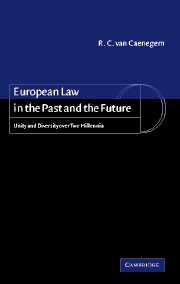Book contents
- Frontmatter
- Contents
- Preface
- 1 The national codes: A transient phase
- 2 Ius commune: The first unification of European law
- 3 Common law and civil law: Neighbours yet strangers
- 4 The holy books of the law
- 5 Why did the ius commune conquer Europe?
- 6 Law is politics
- Epilogue: A look into the twenty-first century
- Bibliography
- Index
4 - The holy books of the law
Published online by Cambridge University Press: 06 August 2009
- Frontmatter
- Contents
- Preface
- 1 The national codes: A transient phase
- 2 Ius commune: The first unification of European law
- 3 Common law and civil law: Neighbours yet strangers
- 4 The holy books of the law
- 5 Why did the ius commune conquer Europe?
- 6 Law is politics
- Epilogue: A look into the twenty-first century
- Bibliography
- Index
Summary
BIBLICAL AND LEGAL SCRIPTURE
The ius commune of the Continent was bookish law in the sense that it was based, not on native custom and accumulated case law, but on one ‘legal bible’, a ‘holy book’, the Corpus iuris civilis. The comparison with the real holy books of the great religions – Bible, Torah, Koran – is justified by the veneration with which the medieval glossators treated the Corpus, as the ultimate and authoritative revelation of legal perfection: ‘reason put in writing’. We shall now analyse three examples of legal ‘holy books’, which were subjected to the sort of exegesis which is normally associated with the elucidation of the exact meaning of the great religious revelations. Our examples are the Corpus iuris, the Constitution of the United States and the Code civil of France.
The comparison between legal texts and scripture has been made by several scholars. The aforementioned Professor Peter Stein wrote in 1973 that the glossators regarded the Justinianic texts ‘as having an almost sacred authority’ and in 1979 he wrote that these texts ‘have been regarded from medieval times as having quasi-biblical authority’. English sixteenth-century statutes were said to be ‘like Scripture’ and it was added that ‘given the authoritative aura that surrounded the statutes, the judges would not appear to be idiosyncratic or cavalier in their exegesis’ – hence the need for rules of construction.
- Type
- Chapter
- Information
- European Law in the Past and the FutureUnity and Diversity over Two Millennia, pp. 54 - 72Publisher: Cambridge University PressPrint publication year: 2001



